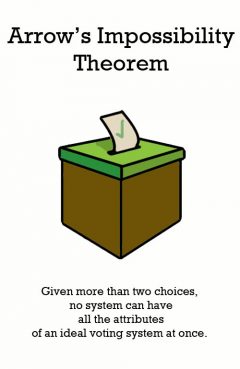Arrow's Impossibility theorem

Release Date: //1951
Country of Release:
Length:
MPAA:
Medium: Paradox
Genre:
Release Message: Given more than two choices, no system can have all the attributes of an ideal voting system at once. Authored by Kenneth Arrow.
Description: In social choice theory, Arrow's impossibility theorem, the General Possibility Theorem, or Arrow's paradox, states that, when voters have three or more distinct alternatives (options), no rank order voting system can convert the ranked preferences of individuals into a community-wide (complete and transitive) ranking while also meeting a pre-specified set of criteria. These pre-specified criteria are called unrestricted domain, non-dictatorship, Pareto efficiency, and independence of irrelevant alternatives. The theorem is often cited in discussions of election theory as it is further interpreted by the Gibbard-Satterthwaite theorem.